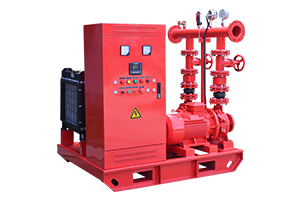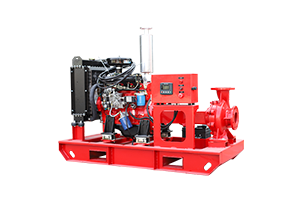What is the typical lifespan of a fire pump?
Jan 18, 2024
Share:
The typical lifespan of a fire pump can vary depending on several factors, including the type of pump, its usage, maintenance practices, and environmental conditions. In general, fire pumps are designed to have a relatively long lifespan, often ranging from 20 to 30 years. However, it's important to note the following considerations:
1. **Type of Pump:** There are different types of fire pumps, such as centrifugal pumps and positive displacement pumps. Each type may have its own lifespan based on its design and construction.
2. **Usage and Demand:** The frequency of use and the demand placed on the fire pump can affect its lifespan. Fire pumps in facilities with high fire protection requirements or frequent testing may experience more wear and tear.
3. **Maintenance:** Regular maintenance is crucial for ensuring the longevity and reliability of a fire pump. Proper maintenance practices, including inspections, lubrication, and testing, can extend the lifespan of the pump and help identify and address potential issues early.
4. **Environmental Conditions:** The environmental conditions in which the fire pump operates can impact its lifespan. Exposure to extreme temperatures, corrosive environments, or other harsh conditions may affect the pump's components.
5. **Technological Advancements:** Advancements in technology and improvements in pump design may result in newer models with enhanced features and longer lifespans. Upgrading to newer models may be considered to take advantage of improved efficiency and reliability.
6. **Compliance with Standards:** Following industry standards and regulations for the installation, testing, and maintenance of fire pumps is essential. Compliance ensures that the pump is operating as intended and contributes to its overall lifespan.
It's recommended to consult with the manufacturer's guidelines and specifications for the specific fire pump in use. Additionally, working with qualified fire protection professionals and adhering to local codes and standards is crucial for maintaining a fire pump system that is both effective and reliable over its lifespan. Regular testing and inspections, often required by codes, are important for ensuring that the fire pump is in proper working condition when needed.
.jpg)
1. **Type of Pump:** There are different types of fire pumps, such as centrifugal pumps and positive displacement pumps. Each type may have its own lifespan based on its design and construction.
2. **Usage and Demand:** The frequency of use and the demand placed on the fire pump can affect its lifespan. Fire pumps in facilities with high fire protection requirements or frequent testing may experience more wear and tear.
3. **Maintenance:** Regular maintenance is crucial for ensuring the longevity and reliability of a fire pump. Proper maintenance practices, including inspections, lubrication, and testing, can extend the lifespan of the pump and help identify and address potential issues early.
4. **Environmental Conditions:** The environmental conditions in which the fire pump operates can impact its lifespan. Exposure to extreme temperatures, corrosive environments, or other harsh conditions may affect the pump's components.
5. **Technological Advancements:** Advancements in technology and improvements in pump design may result in newer models with enhanced features and longer lifespans. Upgrading to newer models may be considered to take advantage of improved efficiency and reliability.
6. **Compliance with Standards:** Following industry standards and regulations for the installation, testing, and maintenance of fire pumps is essential. Compliance ensures that the pump is operating as intended and contributes to its overall lifespan.
It's recommended to consult with the manufacturer's guidelines and specifications for the specific fire pump in use. Additionally, working with qualified fire protection professionals and adhering to local codes and standards is crucial for maintaining a fire pump system that is both effective and reliable over its lifespan. Regular testing and inspections, often required by codes, are important for ensuring that the fire pump is in proper working condition when needed.
.jpg)






